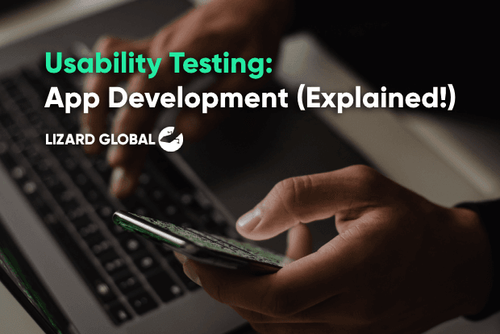Top Reasons to Hire a Mobile App Development Agency
Get the latest updates about our blog posts.
Subscribe so you don’t miss out!
Key Takeaways
- Cost Efficiency: Hiring a mobile app development agency gives you access to a full team of experts for the cost of a single in-house developer, helping you save money and resources.
- Faster Time to Market: Agencies are equipped to start immediately, with established workflows and tools to help you launch your app in record time.
- Access to Top Talent: Skip the recruitment hassle—agencies offer experienced designers, developers, and QA experts under one roof.
- Focus on Growth: Partnering with an agency allows you to concentrate on scaling your business, building partnerships, and securing funding while they handle the technical complexities.
- Risk Mitigation: Agencies bring proven experience, reducing the risk of costly mistakes and ensuring your app is built to industry standards.
It’s 2025, and your startup is buzzing with excitement. You’ve got the perfect app idea—the one that’s going to revolutionize your industry, win hearts, and maybe even go viral. But now, you’ve hit the million-dollar question: Should you hire a mobile app development agency or build an in-house team?
It’s not an easy decision. On one hand, you want full control and a dedicated team working exclusively on your vision. On the other hand, time, budget, and expertise might not be on your side. Sound familiar?
Don’t worry, you’re not alone! Many startups face this crossroads, and that’s exactly why we’re here. In this blog, we’ll unpack the pros and cons of both options, shed light on the hidden challenges, and help you decide which path is the best fit for your startup’s goals. So, grab your favorite coffee (or tea—we don’t judge) and let’s dive in!
Startups: Why Building An In-House Development Team Might Not Be The Best Option Just Yet
For many startups, the idea of building an in-house team seems logical. After all, having full control over development, and a team physically close to your operations can be attractive. However, there are critical challenges that make this option less viable in the early stages of a business.
1. High Initial Costs
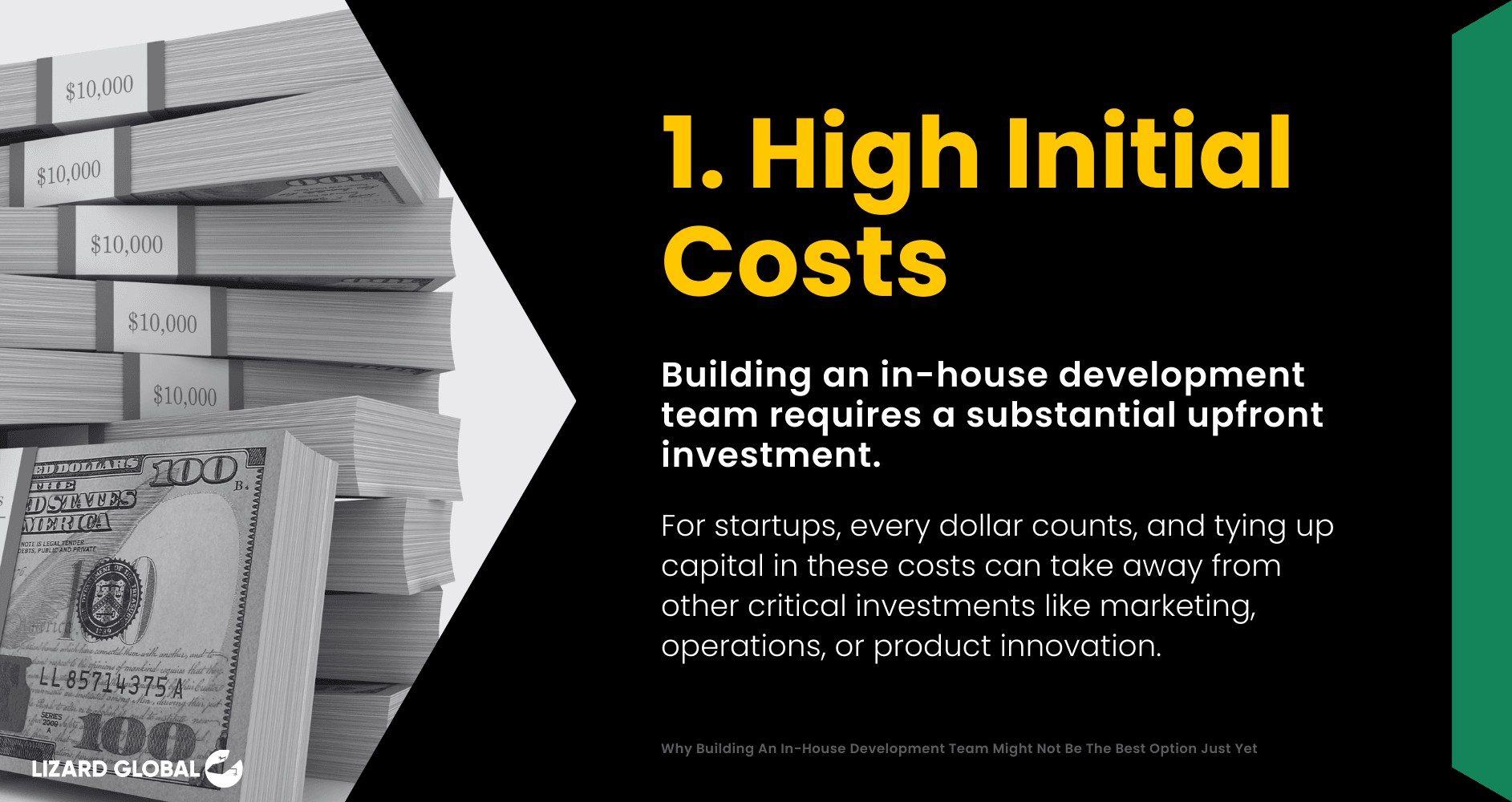
Building an in-house development team requires a substantial upfront investment. Salaries for skilled developers can be steep, and that’s just the beginning. You’ll also need to take into account additional costs like employee benefits (healthcare, paid leave, bonuses), training, and providing the tools and software they need to do their jobs effectively.
On top of that, you’ll have to set up a physical or virtual workspace. Whether that means renting office space or equipping remote workers with laptops, monitors, and software subscriptions. These are added expenses, and for startups, every dollar counts, and tying up capital in these costs can take away from other critical investments like marketing, operations, or product innovation.
2. Time-Consuming Hiring Process
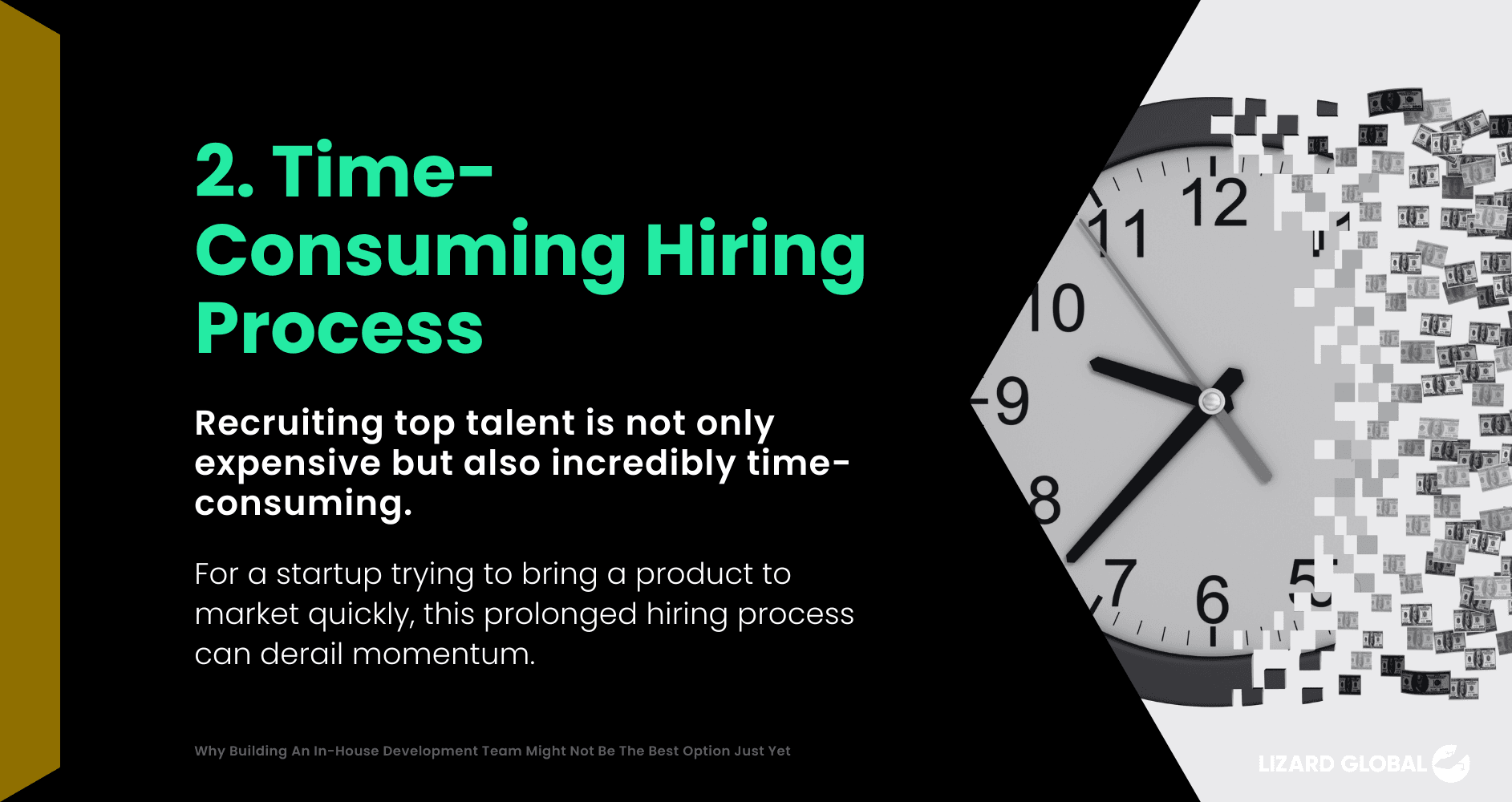
Recruiting top talent is not only expensive but also incredibly time-consuming. Crafting compelling job descriptions, advertising roles, sifting through applications, and conducting multiple rounds of interviews can take weeks—or even months.
And once you’ve made a hire, onboarding and training take additional time, which delays your project further. And let’s not forget, startups are competing with established companies for the same pool of highly skilled developers.
Without a well-known brand or deep pockets, attracting top talent can feel like an uphill battle. For a startup trying to bring a product to market quickly, this prolonged hiring process can derail momentum.
3. Limited Access to Diverse Expertise

The scope of building a mobile app extends far beyond just coding. It involves UI/UX design, front-end and back-end development, QA testing, security protocols, database management, and sometimes even advanced technologies like Artificial Intelligence (AI) or AR/VR. Finding developers who excel in all these areas is almost impossible.
Even if you assemble a small team, they may lack the breadth of experience needed to address complex challenges or optimize performance. Building a robust, scalable app often requires specialized expertise that takes years to acquire, and it’s unlikely that a newly formed in-house team will check every box.
4. Management Overhead
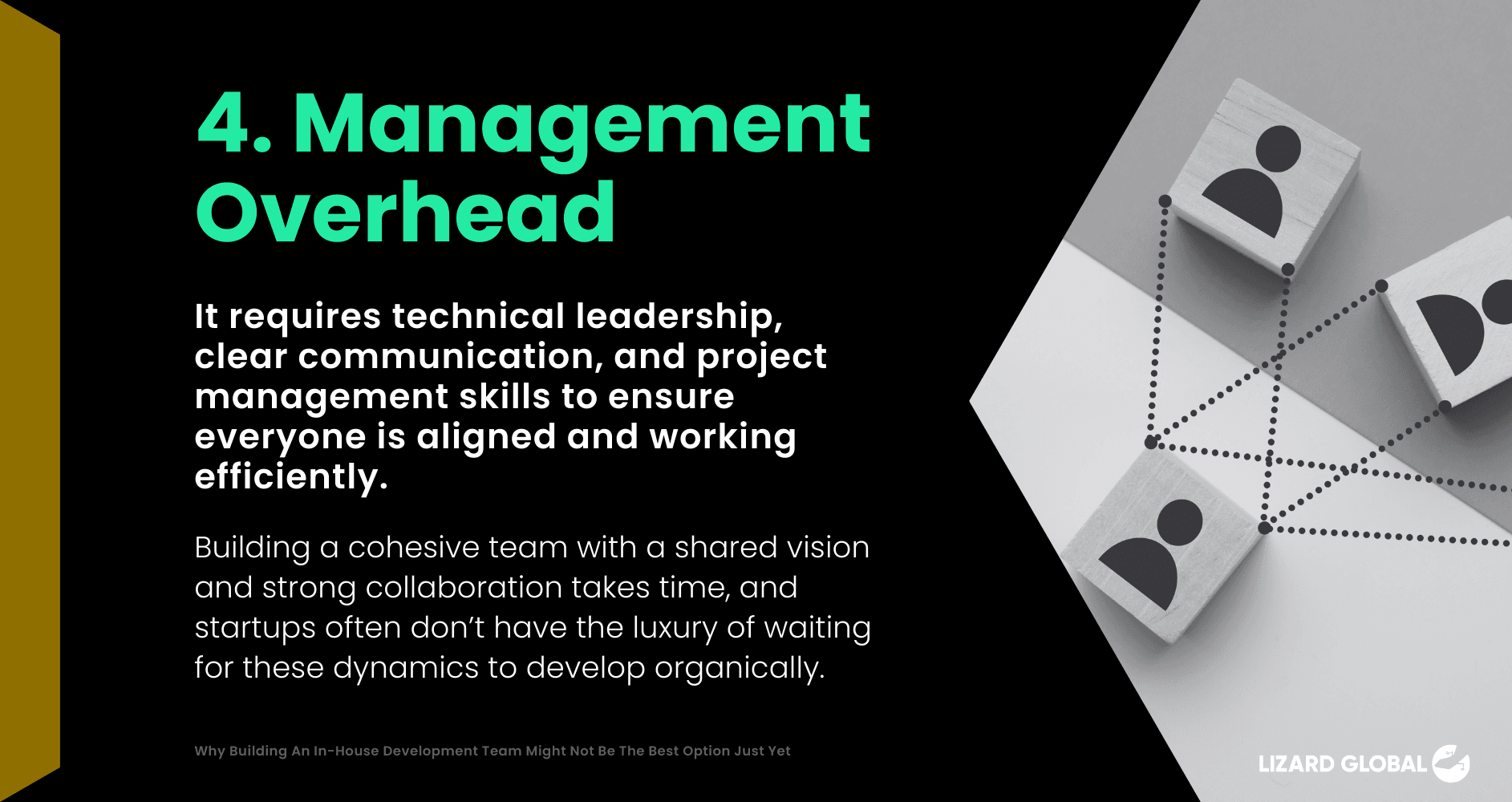
Managing a development team is no small feat. It requires technical leadership, clear communication, and project management skills to ensure everyone is aligned and working efficiently. If your startup doesn’t already have a Chief Technolofy Officer (CTO) or an experienced project manager, these responsibilities often fall on the founder or another senior team member.
This added workload can be overwhelming, especially when combined with other startup responsibilities like pitching to investors, refining your business model, and scaling operations. Without proper oversight, in-house teams can face issues like misaligned priorities, missed deadlines, and low-quality output.
Additionally, team dynamics play a crucial role in productivity. Building a cohesive team with a shared vision and strong collaboration takes time, and startups often don’t have the luxury of waiting for these dynamics to develop organically.
5. Inflexibility in Scaling
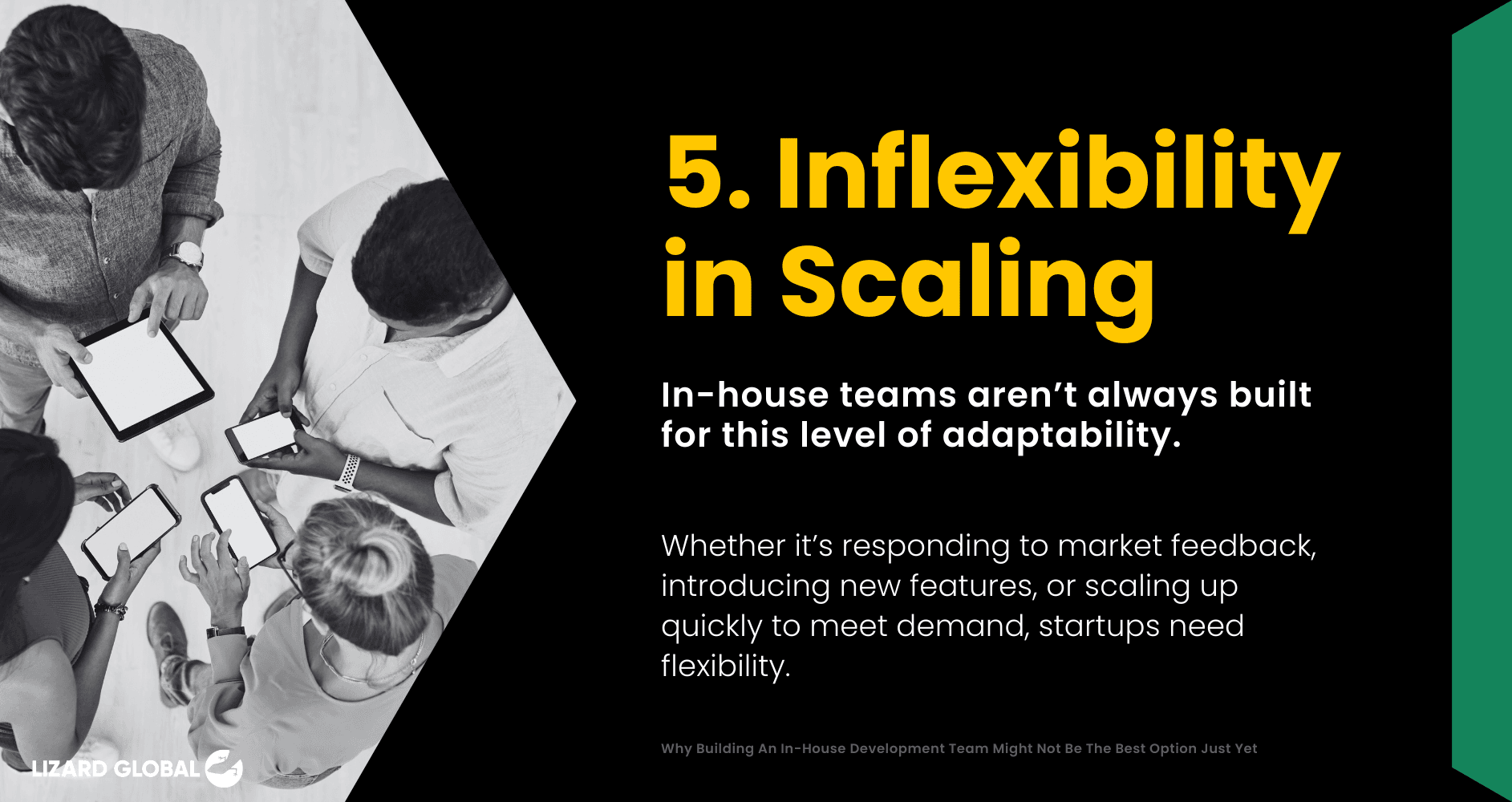
One of the greatest challenges for startups is adapting to change. Whether it’s responding to market feedback, introducing new features, or scaling up quickly to meet demand, startups need flexibility. Unfortunately, in-house teams aren’t always built for this level of adaptability.
When you hire full-time employees, you commit to paying their salaries regardless of how much work there is. If your app requires specialized skills for a short-term phase (e.g., advanced UI design or API integration), you’ll either need to hire additional staff temporarily or stretch your existing team beyond their capabilities.
On the flip side, if your project slows down or pivots, you may find yourself overstaffed, incurring unnecessary costs for underutilized resources.
Why Hiring An Agency Is Beneficial To Startups?
1. Cost Efficiency
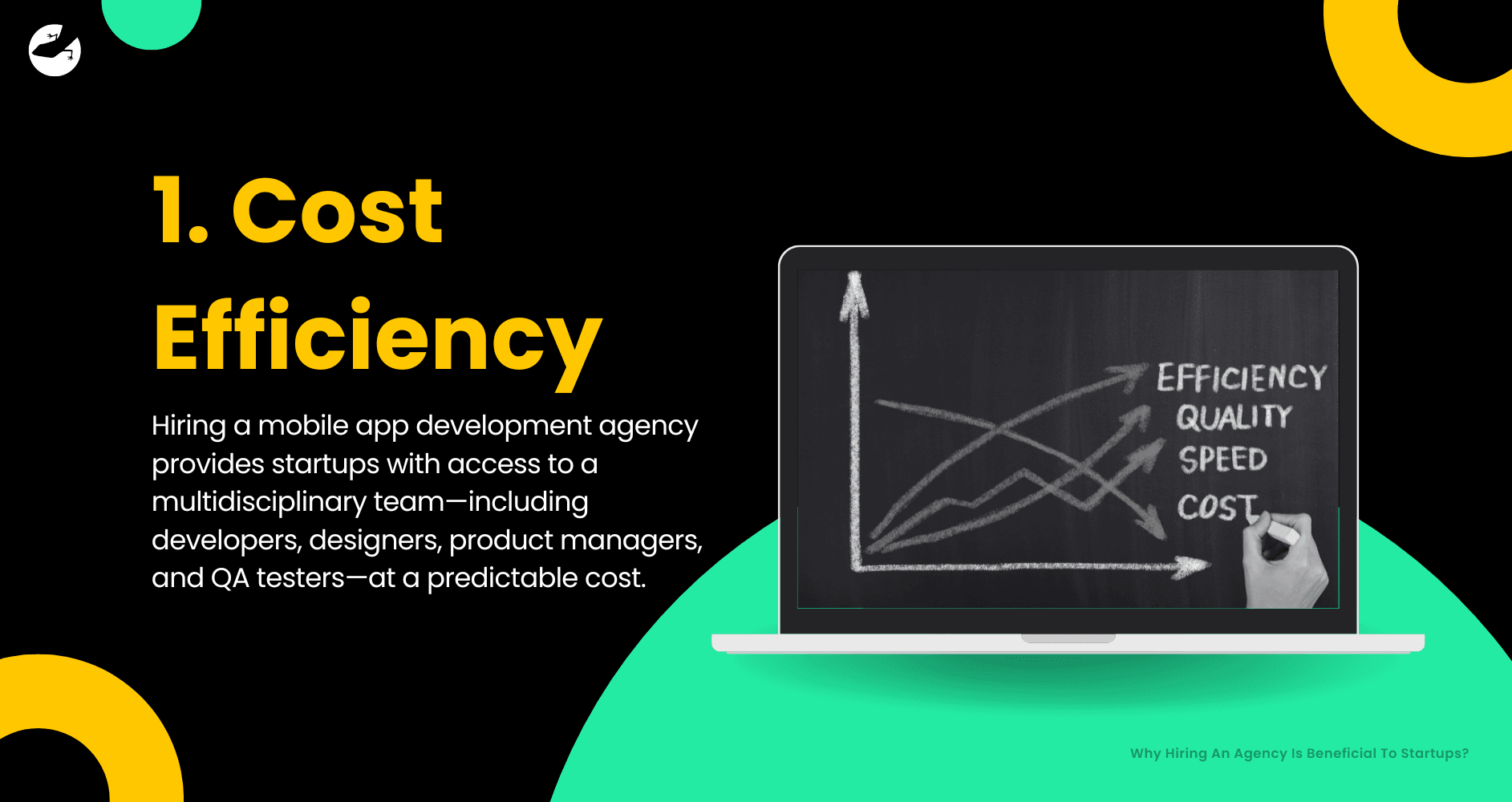
Hiring a mobile app development agency provides startups with access to a multidisciplinary team—including developers, UI/UX designers, product managers, and QA testers—at a predictable cost. Unlike building an in-house team, where you incur expenses for salaries, benefits, office space, software licenses, and training, an agency allows you to bypass these additional costs entirely.
Agencies operate on a project-based or retainer model, giving you clear visibility into the financial commitment from the start. This financial clarity is particularly beneficial for startups operating on tight budgets, as it minimizes the risk of unexpected expenses. Furthermore, the agency model eliminates costs associated with recruitment, such as job postings, onboarding, and employee turnover, which can be both time-consuming and costly.
Want to find out how much it costs to build your dream app or web app?
2. Faster Time to Market
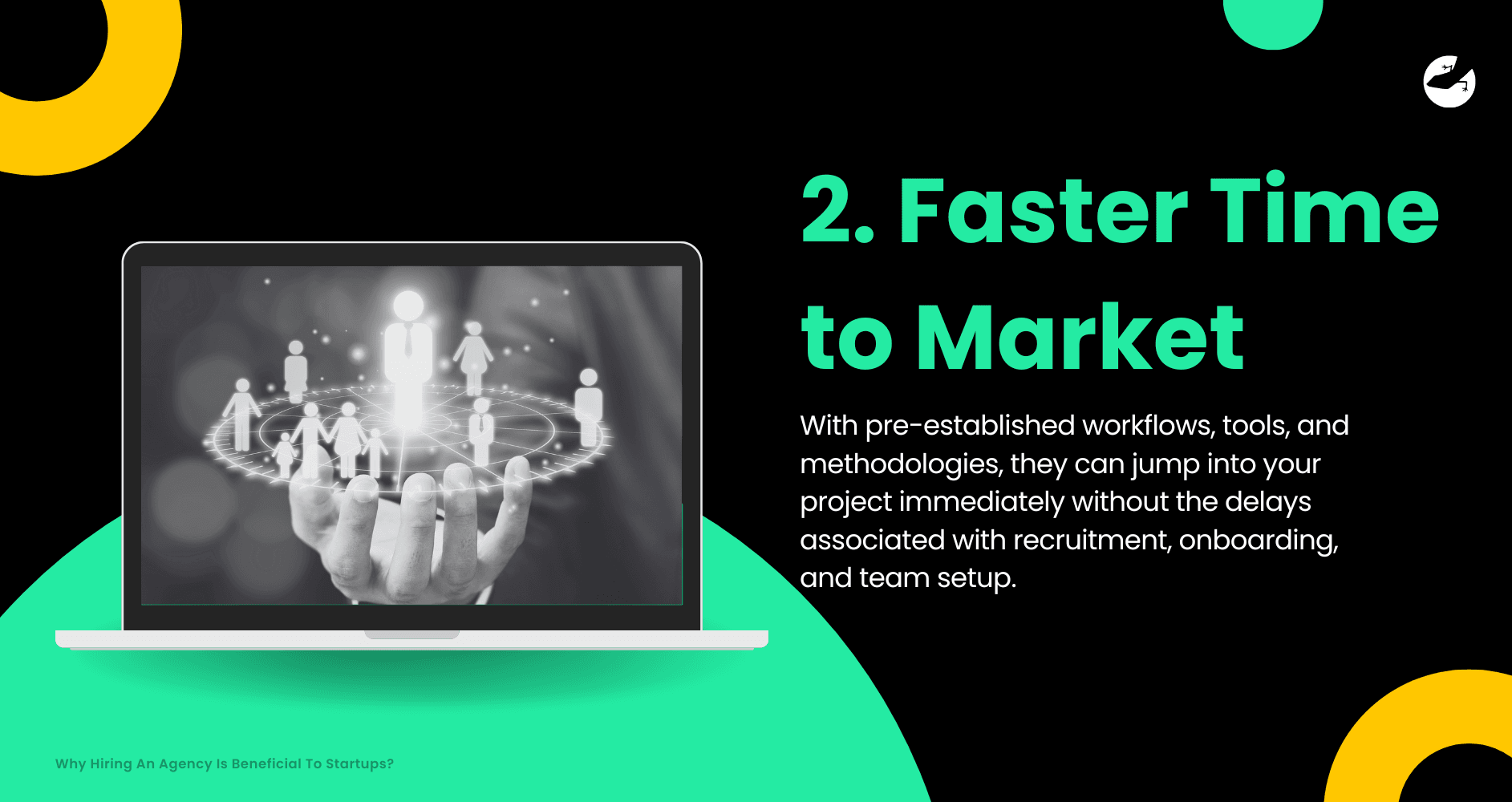
Agencies are ready to hit the ground running. With pre-established workflows, tools, and methodologies, they can jump into your project immediately without the delays associated with recruitment, onboarding, and team setup. This is especially critical for startups aiming to capture market opportunities or meet investor deadlines.
Agencies leverage agile development practices, which prioritize iterative development and frequent feedback. This approach not only speeds up the development process but also ensures that your app evolves in line with user expectations. Additionally, agencies often have access to reusable code libraries, frameworks, and APIs, which can further accelerate development timelines.
3. Access to Specialized Expertise
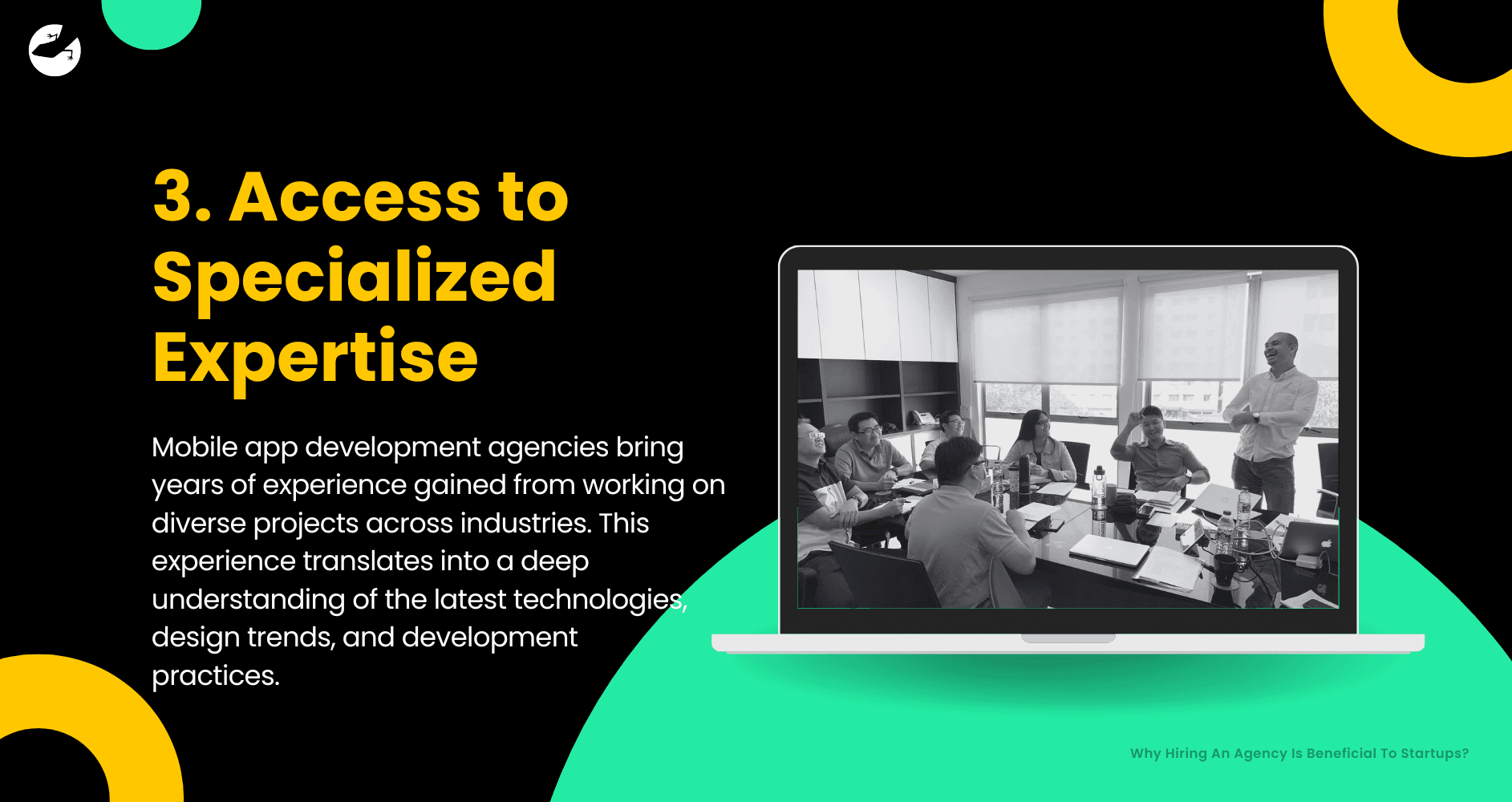
Mobile app development agencies bring years of experience gained from working on diverse projects across industries. This experience translates into a deep understanding of the latest technologies, design trends, and development practices.
For example, agencies often employ specialists in areas like AI integration, AR/VR features, cloud-based solutions, and advanced security protocols. This expertise ensures that your app is not only functional but also innovative and future-proof. Furthermore, agencies are constantly updating their knowledge and skills to remain competitive, so you benefit from their up-to-date technical expertise without having to invest in training or research.
4. Scalability and Flexibility
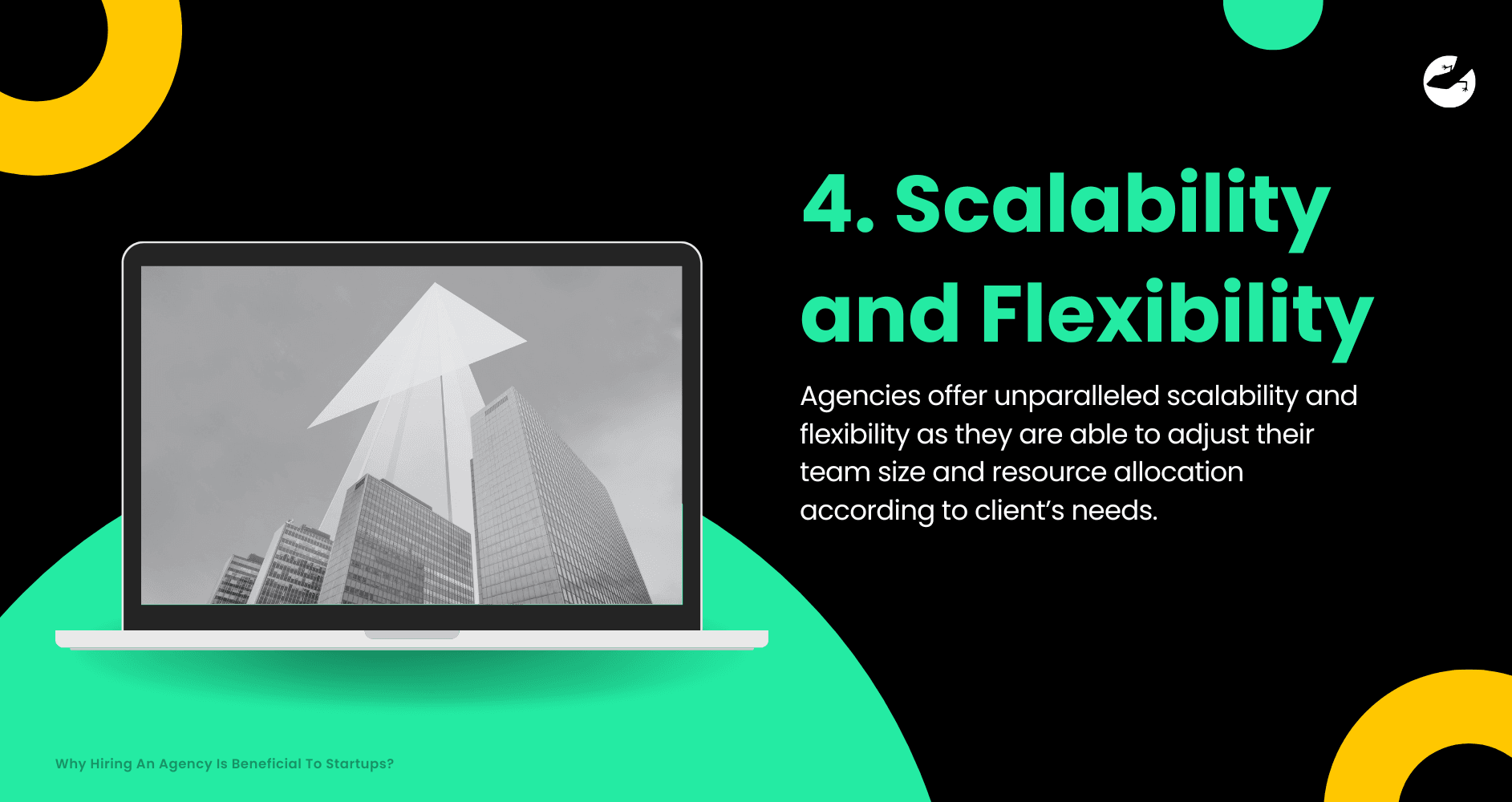
Startups operate in dynamic environments where priorities and requirements can shift rapidly. An in-house team may struggle to adapt to sudden changes due to limited resources or rigid staffing structures. In contrast, agencies offer unparalleled scalability and flexibility.
Whether you need to accelerate development to meet a tight deadline or reduce resources during a slower phase, agencies can adjust their team size and resource allocation accordingly. This scalability ensures that you’re only paying for the resources you need when you need them, avoiding inefficiencies and unnecessary costs.
Additionally, agencies can seamlessly onboard specialists, such as UI/UX designers or backend developers, for specific project phases without disrupting the overall workflow. This ability to pivot quickly gives startups a competitive edge in responding to market demands.
5. Focus on Core Business Activities
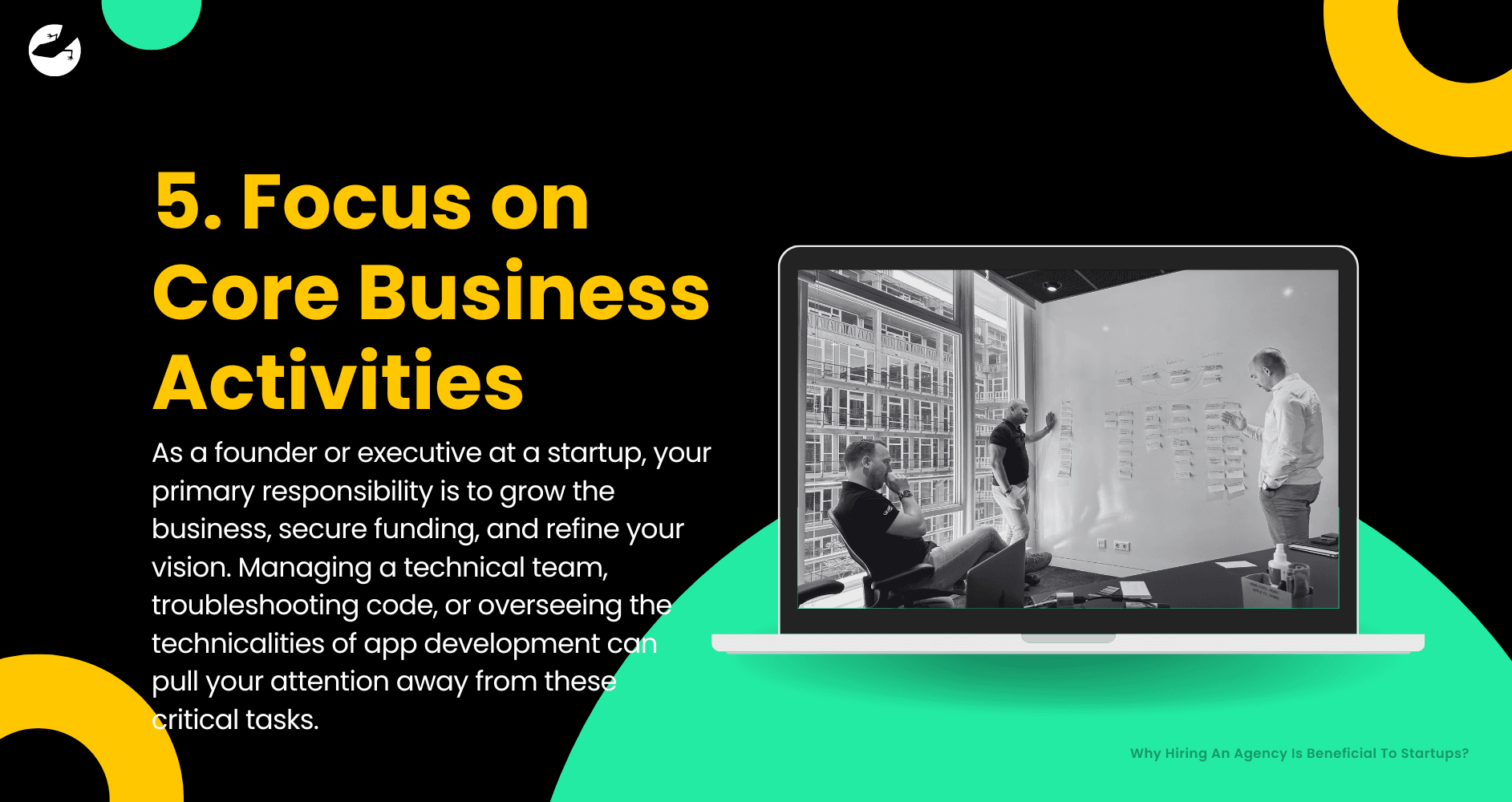
As a founder or executive at a startup, your primary responsibility is to grow the business, secure funding, and refine your vision. Managing a technical team, troubleshooting code, or overseeing the technicalities of app development can pull your attention away from these critical tasks.
Outsourcing app development to an agency allows you to delegate technical responsibilities to a trusted partner, freeing up your time to focus on strategic activities such as building partnerships, creating marketing strategies, and engaging with customers. By prioritizing growth and innovation, you position your startup for long-term success while ensuring your app development is in capable hands.
6. Reduced Risk
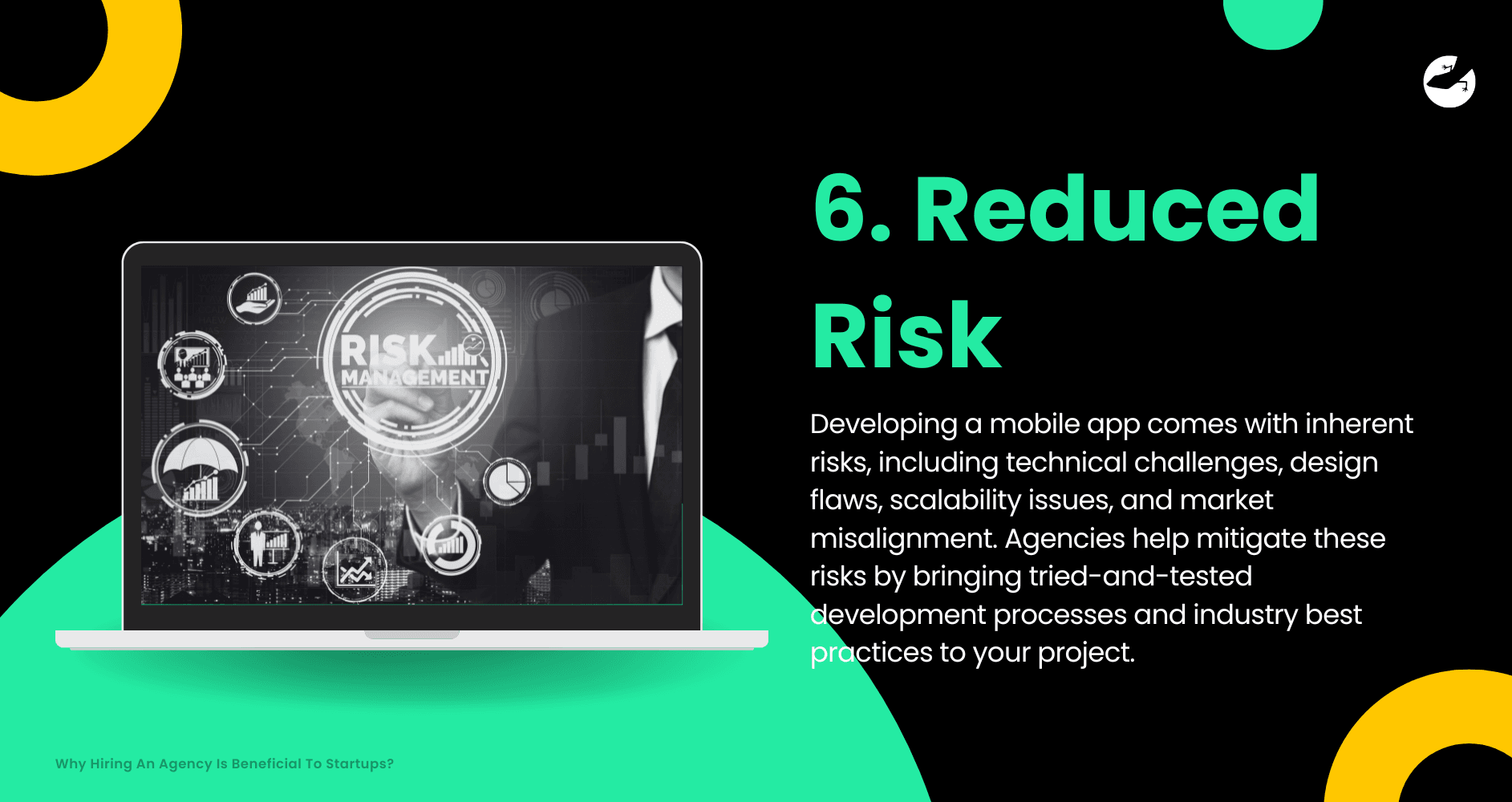
Developing a mobile app comes with inherent risks, including technical challenges, design flaws, scalability issues, and market misalignment. Agencies help mitigate these risks by bringing tried-and-tested development processes and industry best practices to your project.
For example, agencies conduct thorough market research and competitor analysis before development begins, ensuring that your app aligns with user expectations and market trends. They also perform rigorous quality assurance (QA) testing to identify and address bugs, usability issues, or performance bottlenecks before launch.
By leveraging their experience and structured processes, agencies reduce the likelihood of costly mistakes, ensuring your app is technically sound, user-friendly, and ready to meet market demands.
7. Proven Track Record
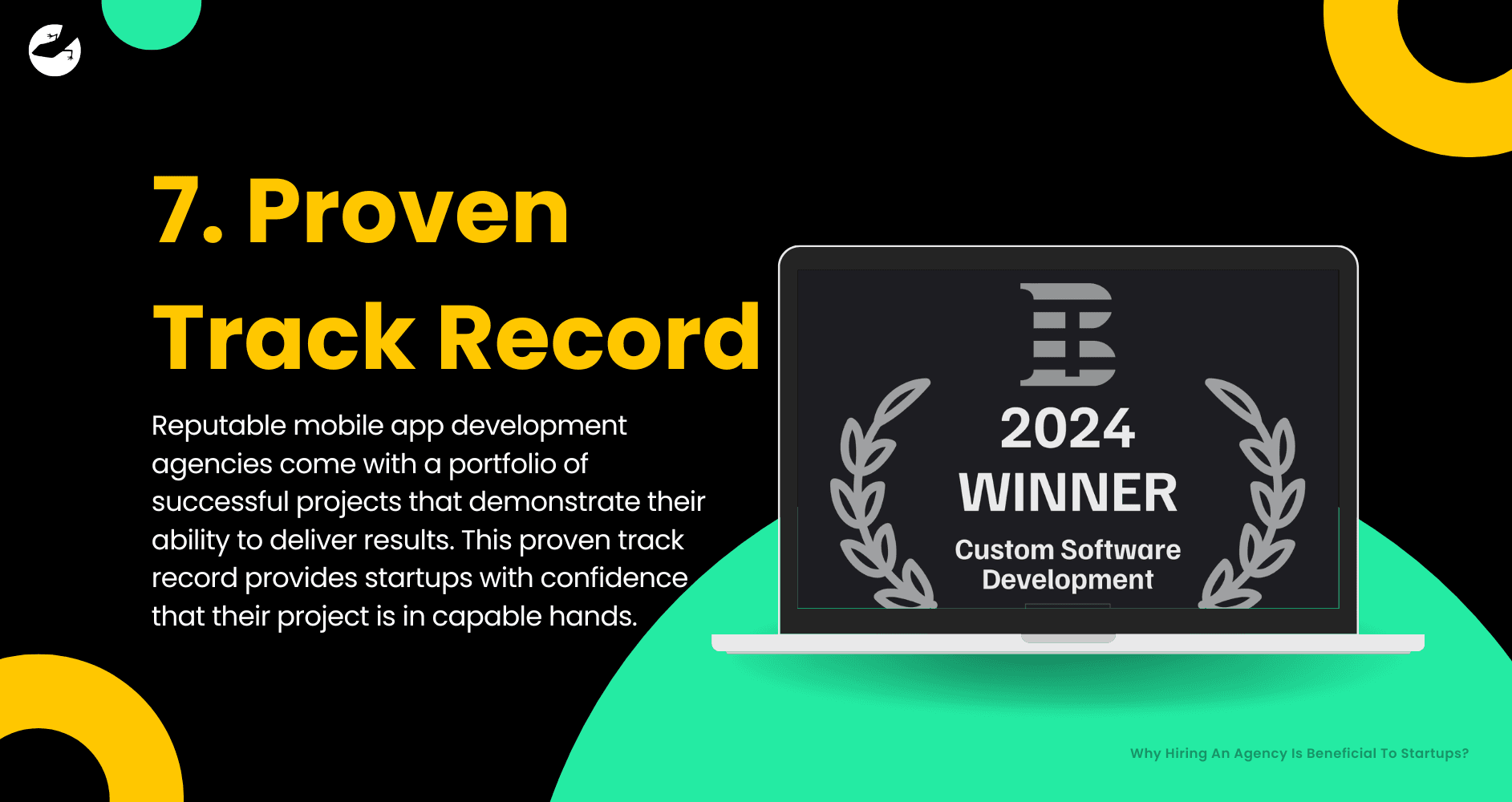
Reputable mobile app development agencies come with a portfolio of successful projects that demonstrate their ability to deliver results. This proven track record provides startups with confidence that their project is in capable hands.
Moreover, agencies with a history of success often bring established relationships with technology partners, such as cloud service providers or third-party API developers, enabling smoother integration and better resource access for your project.
Let’s Build Your Dream App Together
At Lizard Global, we’re more than just developers—we’re your growth partner. We understand the challenges startups face, be it mobile app development, web app development, UI/UX design, growth analytics we’re here to help you overcome them with scalable, market-ready solutions.

Still not convinced? Let our clients do the talking. Check out our video testimonials or +55 five-star reviews, all independently verified by a third party.
Ready to get started? Contact us today to discuss your project and take the first step toward bringing your vision to life.


